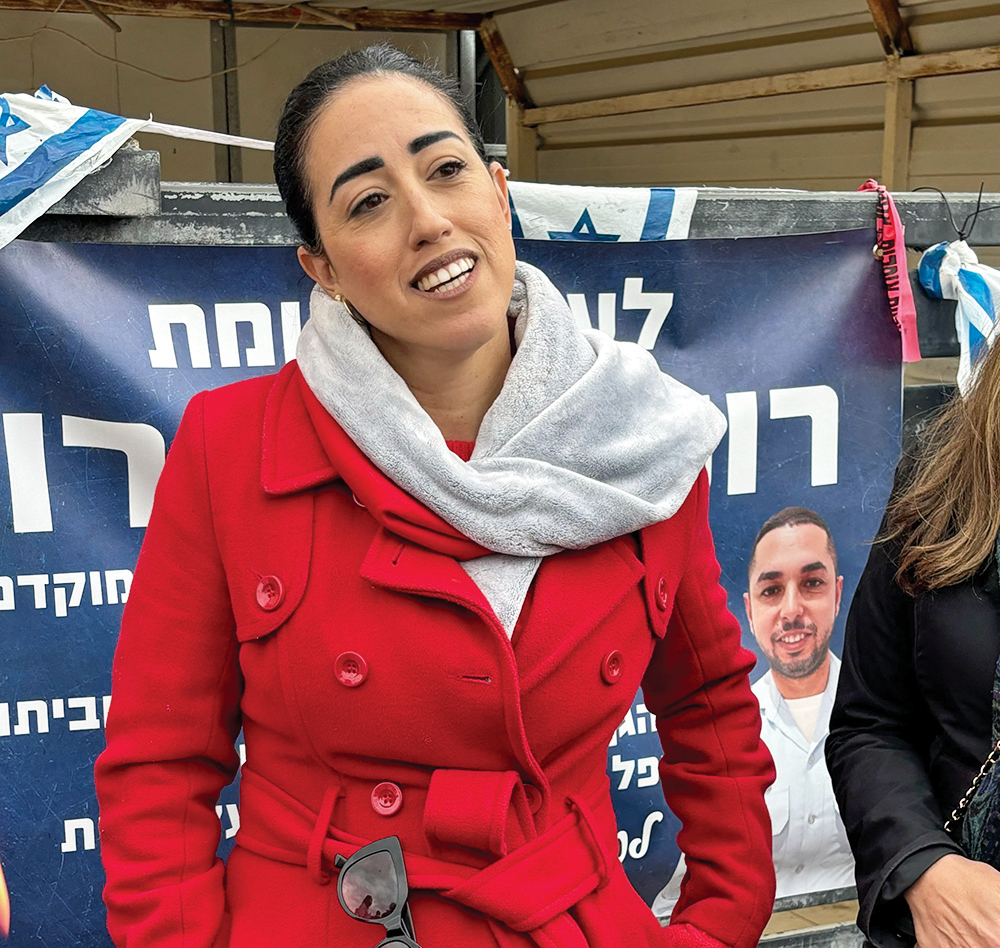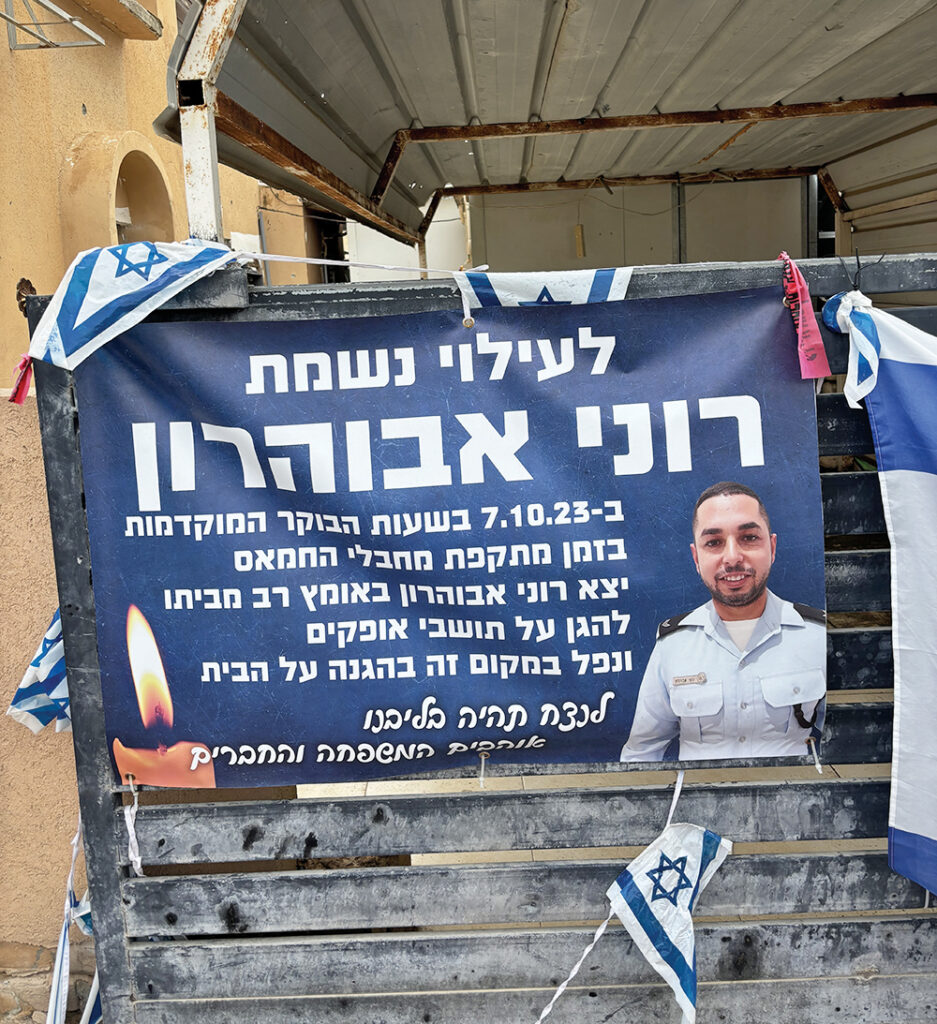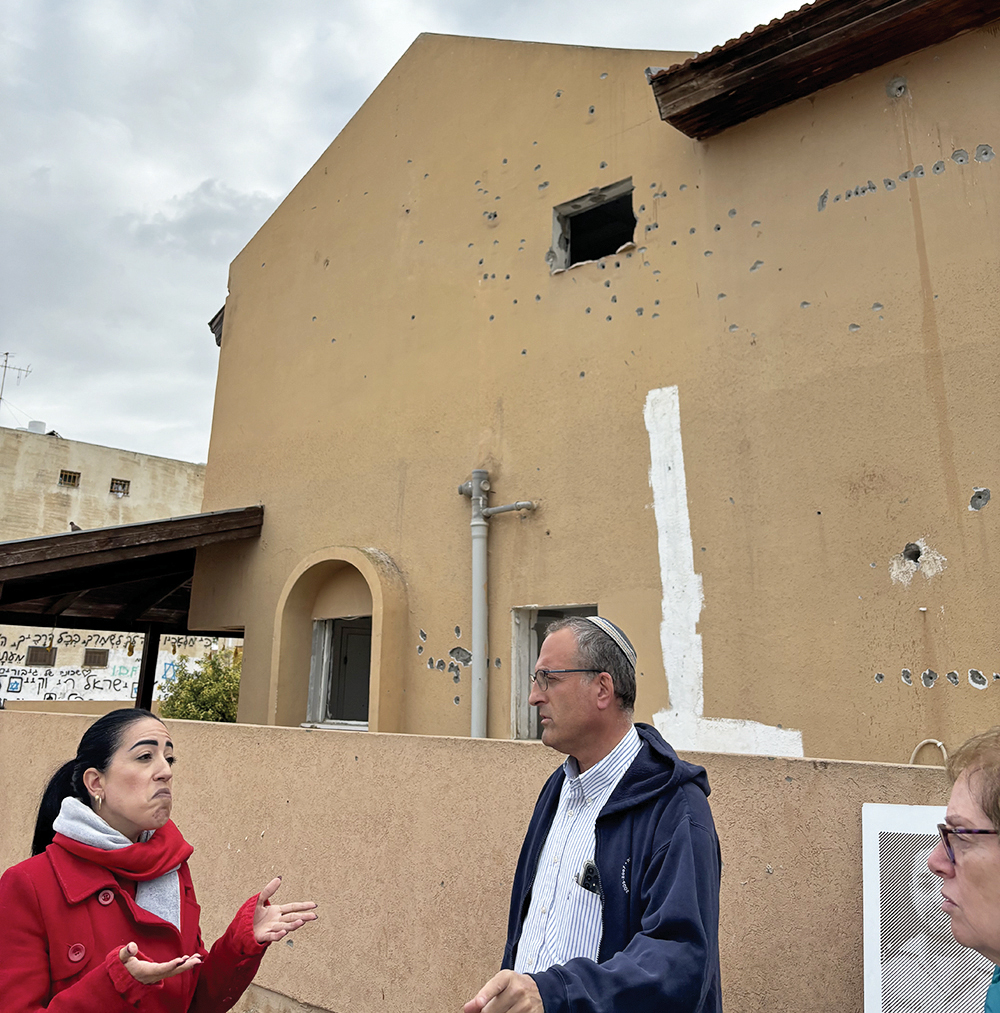
October 7, 2023 will long be remembered as a day of tragedy for the Jewish people. But what has also emerged are numerous reports of incredible bravery, heroism and sacrifice. Some have been well publicized while others have not gotten wide circulation. On our recent trip to Israel we were privileged to learn about several of these fallen heroes, and I feel an obligation to share their inspiring stories and preserve their memories.
Ofakim (population: 33,000) is a town about 12 miles from Beersheba and 15.5 miles from Gaza. It was founded as a development community for mostly Moroccan and Tunisian immigrants in 1955. On October 7, Ofakim became the furthest community from Gaza reached by Hamas terrorists. We met there with Shiran Abuharon, wife of Roni Abuharon, HY”D (age 39), a detective from Ofakim. Roni actually worked in the Arab town of Rahat and Shiran always worried for his welfare as violent crimes were not uncommon there. We met in front of a memorial setup where he died, one of dozens such memorials to fallen heroes throughout the town. Each includes a smiling picture and a brief description of their heroism accompanied by yahrzeit candles in a metal container.
On that Shabbat/Simchat Torah morning the town awoke to a rocket barrage and the accompanying sirens warning to get to shelters. Most of the older houses in the neighborhood did not have safe rooms, so people left their homes to run to public outdoor shelters. This was part of the Hamas plan—to lure people out, where they would be easy targets.

Terrorists entered the Mishor Gefen neighborhood and began killing. What Hamas didn’t realize was that several police officers lived in that neighborhood. When Roni Abuharon heard gunfire he grabbed his pistol and police hat and ran outside as did several other off duty police officers, former IDF and ordinary civilians, about 10 in all. It was a mismatch as the residents were armed with light weapons, facing terrorists with rocket propelled grenades and AK-47s. Shiran contacted Ron’s brother in Beersheba, a 20 minute drive away and he sped to join in the defense. Roni began rushing people off the streets and back into the relative safety of their homes. The last people he escorted were David and Rachel Edri, later known as the “cookie lady.” It was then that terrorists on foot came and shot Roni in front of the Edri home. Five terrorists entered the Edri home, taking them as hostages. Roni’s brother arrived at the scene to find his brother’s body on the blood-soaked pavement.
As is well documented, Rachel Edri survived by offering to treat one of the wounded terrorists, giving them cookies and snacks, singing and playing games. Fifteen hours later they were rescued by a Yamam counterterrorism unit, accompanied by the Edris’ son, who drew a diagram of entrances to the house, facilitating the rescue.
Shiran took us up the block, where we passed many other memorials to the fallen. Two brothers—Ariel Refael Guri, 30, and IDF Staff Sgt. Roi Haim Guri, 21—left their homes to protect their families. Ariel walked out armed but barefoot, and Roi unarmed but insisting on going to protect his brother. Both were killed. Yigal Ilouz, 56, another officer, was coming off his shift when he rushed to the scene with his vest and helmet; a sniper in the Edri house shot him in the neck above his vest. Shiran chronicled the story of each of the fallen. Fifty-two residents of Ofakim lost their lives that day.
Continuing our walk through town, Shiran took us to the road where the terrorists entered with their trucks. A woman was walking her dog and passed by our small group. She turned to Shiran, whom she had not met previously, and asked: “Are they here because of what happened?” For a moment I felt that perhaps we were intruding on the town’s privacy. Instead, gripped with emotion, she recounted how she should have been one of the first killed when the terrorists entered her street, parked their vehicles and methodically laid down their arsenal on the sidewalk to retrieve when needed. She saw them and immediately shut her gate and ran inside, telling her family to get down and be quiet. Her neighbors who were outside were killed. The terrorists came and knocked on her door, yelling “Mishtara, ptach et hadelet!” (Police, open the door!) and “Zaka, ptach.” Her daughter asked if she should say Shema since they would be killed, but the terrorists left to find other victims. She showed us a chilling video shown on Al Jazeera circulated by the terrorists of her closing her gate at the start of the murderous rampage. Soon, three older gentlemen joined us and thanked us for coming, telling how much our support meant to them.
Roni Abuharon and 10 courageous individuals interfered with the terrorists’ plan, eliminated several attackers and bought time for Ofakim residents to seek shelter until a larger force arrived. Several families came to Shiran saying they owed their lives to her husband’s bravery, escorting them to safety. “I always knew my husband was a hero; now I want the world to know.”

Rabbi Ari Katz, director of public relations for the Yeshivat Hesder in Sderot, related to me another incredible story of a true Israeli hero, Col. (res.) Lion Bar, age 53. After the sirens sounded in Sderot—nothing residents weren’t accustomed to—word began to spread of a terrorist infiltration. Still, no one expected the magnitude of the attack. A rebbe from the yeshiva and his son were walking to shul that morning. The son, who was armed, was going to continue on to the yeshiva for tefillah while his father went to the local shul. Upon hearing of possible terrorists in town, worshippers at the local shul asked the rebbe’s son, a Givati brigade soldier, to daven with them since he had a weapon, and he agreed. The father decided to quickly go home to tell his wife of the change in plans.
Sure enough, terrorists targeted the beit knesset, lobbing a grenade at the entrance. They surrounded the building, but the armed soldier with a single magazine in his gun and another worshiper with a pistol returned fire. Together, they held off the terrorists, who left, saving a shul full of people.
The father was not as lucky. On his way home he was shot in the chest and severely wounded. He managed to get home to his wife and was having trouble breathing as his chest filled with blood. She frantically tried to reach Magen David Adom to no avail, as well as the police station, which had been overrun by Hamas. Just as they were losing hope, there was a knock on the door. In came Col. (res.) Lion Bar, 53, who quickly removed a closet door to use as a stretcher, slid the wounded man into his car and sped off to Soroka Hospital in Beersheba, where he became the first victim operated on that morning; the rebbe’s life was saved.
Where did this “angel” appear from? Bar, who served in the IDF for 26 years, lived in Gedera, a town near Ashdod, a 40-minute drive away. Like the rest of the country, the Bar family woke to sirens, but hoped to get back to sleep. When the sirens persisted and explosions were heard they turned on the news to learn of the incursion with shock and disbelief. Before any reserves were called up, Bar put on his uniform and helmet, got into his car and sped south. When he arrived in Sderot, he found that ambulances were not entering the city as they are not armored. He inquired as to any reports of wounded and was given the address of the wounded rebbe.
Bar spent the entire day from 9 a.m. to 4 p.m. evacuating the victims. He drove to the Nova Music Festival site evacuating tens of wounded to various hospitals. One partygoer said, “He drove like crazy on the highways just to save us; he was really a hero. On the way to the hospital they shot at us, and he succeeded in dodging the bullets and not a single one hit the car. I have nothing to say except thank you. He was truly an angel.”
Bar came home late that afternoon. When his family told him how worried they had been, he responded that this was his mission and what he lives for. The next morning, October 8, he felt there was still more he could do and together with his son, drove back south on empty roads. Empty except for bodies. By this time all they could do was locate corpses and let Zaka know of the locations so they could be buried. Finally, with the army present and Zaka at work, they felt their job was done and headed home. They stopped at a bullet-riddled police vehicle to see if there were other casualties they could evacuate. Suddenly, they were ambushed by terrorists. A grenade was thrown, and they were shot at. Bar’s son Omer was hit twice in the leg but escaped. Lion Bar, hero of the south, was killed.
Roni Abuharon, Col. Lion Bar and the other defenders of Ofakim gave their lives selflessly to save complete strangers. They understood that it was their mission and responsibility to help their fellow Jew. May their memories be a blessing.
Dr. Seth Landa has been a Teaneck resident, Rinat Yisrael member and anesthesiologist at St. Joseph’s University Medical Center in Paterson for the past 33 years.












